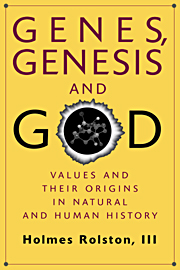Book contents
- Frontmatter
- Contents
- Preface
- Chapter 1 Genetic Values: Diversity and Complexity in Natural History
- Chapter 2 Genetic Identity: Conserved and Integrated Values
- Chapter 3 Culture: Genes and the Genesis of Human Culture
- Chapter 4 Science: Naturalized, Socialized, Evaluated
- Chapter 5 Ethics: Naturalized, Socialized, Evaluated
- Chapter 6 Religion: Naturalized, Socialized, Evaluated
- References
- Index
Chapter 5 - Ethics: Naturalized, Socialized, Evaluated
Published online by Cambridge University Press: 05 June 2012
- Frontmatter
- Contents
- Preface
- Chapter 1 Genetic Values: Diversity and Complexity in Natural History
- Chapter 2 Genetic Identity: Conserved and Integrated Values
- Chapter 3 Culture: Genes and the Genesis of Human Culture
- Chapter 4 Science: Naturalized, Socialized, Evaluated
- Chapter 5 Ethics: Naturalized, Socialized, Evaluated
- Chapter 6 Religion: Naturalized, Socialized, Evaluated
- References
- Index
Summary
Once upon a time natural history produced moral agents, incrementally perhaps, but still appearing where there were none before. Since there isn't any ethics in nature, it may prove challenging to naturalize it. At least there is not much ethics in nature, even if some precursor primate behaviors are part of the story. Ethics is distinctively a product of the human genius, a phenomenon in our social behavior. From a biological perspective, such an emergence of ethics is as remarkable as any other event we know; in some form or other ethics is pervasively present in every human culture, whether honored in the observance or the breach. So we must evaluate origins to discover the nature in, the nature of, our duties. One might know present duties and be ignorant of origins, of course, but a more complete account, if we can gain it, will be enlightening.
There is no science in nature either, but precursors in natural cognition made some connections plausible. Scientific reasoning is perhaps easier to naturalize than ethics (which may prove easier than religion). Yet there must be some story to tell. We need a threefold account: first, how morality happened to appear in past evolutionary time out of precursors in animal behavior; second, what to make of the ethical heritage of cultures over the ages, that with the goal of understanding, third, how morality today can and ought to operate in society, especially (for our purposes) as this relates biology to ethics.
- Type
- Chapter
- Information
- Genes, Genesis, and GodValues and their Origins in Natural and Human History, pp. 212 - 291Publisher: Cambridge University PressPrint publication year: 1999



